Mongolia # 1 – Land of Genghis Khan – October 2014
Mongolia!! The name of this landlocked Asian country has a magical ring to it. We could not think of Mongolia without our minds drifting on the image of the legendary Genghis Khan. Born in the 1160s, he spent his early life assembling a dedicated army of nomads from the immense grasslands of the Gobi, at 500,000 square miles, the fifth largest desert in the world. His fierce warriors were relentless. They could ride day and night, making a slice in their horses’ neck to drink the blood. By 1279 Mongols had gained full control of all of China, undeterred by the Great Wall. See how well walls work?
By 1280 they had stormed across Asia, conquering and burning major cities like Samarkand that lay hopelessly in their path. With perhaps 80,000 mounted fighters followed by a huge herd of spare mounts, they could travel 100 miles a day which was unheard of by other armies of that time. According to one source, they were sent out in teams of ten. If one was captured, the rest of the team was killed. They were unstoppable!
Land of Genghis Khan
When Öegedei Khan, the third son of Genghis Khan and second Great Khan of the Mongol Empire, succeeded his father, he continued the expansion of the empire, and was a world figure when the Mongol Empire reached its farthest extent west and south during the Mongol invasions of Europe and East Asia. He led his ruthless cavalry from the windblown steppe of Central Asia into Europe to amass the largest continuous empire the world has ever seen. It covered 9.15 million square miles of land – more than 16% of the earth’s landmass and ruled over 110 million people between 1270 and 1309 — more than 25% of the world’s population at that time. Despite his and his father’s brutal campaigns, or perhaps because of them, Genghis Khan is still alive in the hearts of Mongols.
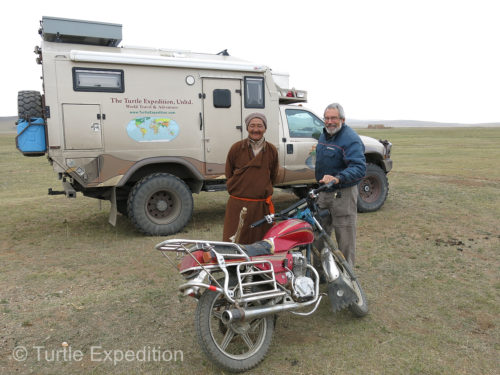
This nice man stopped just to see if we needed anything.
In Mongolian tradition, we should have offered him a cup salty milk tea.
As we drove across the seemingly endless grasslands, skirting the Gobi, free of fences and guardrails that had held us like a mouse in a maze crossing China, we had to stop and soak in the new freedom. It was hard to imagine Genghis Khan’s bloodthirsty hordes galloping across the endless plains. The highway remained good and traffic was light except for the occasional herd of sheep or an overloaded freight semi. Horses and camels grazing near the road gave us a feeling that we had entered a special place. Finding somewhere flat to camp for the night was simply a matter of turning left or right off the tarmac for a hundred yards and deciding which direction the sun would rise in the morning.
The first winter storm had kissed the hills with a frosting of snow south of Ulaanbaatar, the capital of the country. Not wanting to deal with the congestion of a big city, we pulled off into a frozen field just outside of town and called it home. In the morning we blitzed the downtown, first finding a tourist hotel where we could do a quick load of laundry, and then getting lucky, we snuck into an empty space in the center of the mass mid-day confusion that was not marked “Зогсоолгүй”, (no parking). Finding a store where we could buy a SIM card for our phone and then the tourist office for maps and information was all within walking distance.
An early start the next morning got us out of town before the mad rush hour. We headed west for the small town of Olgii where the famous Golden Eagle Festival was about to begin. The tourist office had advised that the road was open and that it was a two-day drive.—That’s how long it took busses. It was not mentioned that much of the road was not paved and that busses drove 24 hours a day, usually in pairs because one often broke down. We would return to Ulaanbaatar again to retrieve parts for our suspension, but that’s another story.
- As we drove across the seemingly endless grasslands, skirting the Gobi, free of fences and guardrails that had held us like a mouse in a maze crossing China, we had to stop and soak in the new freedom.
- Horses and camels grazing near the road gave us a feeling that we had entered a special place.
- It wasn’t even dark yet, but we stopped just to enjoy the view of the unfenced grassland.
- With no fences anywhere, sheep can graze wherever they choose. An early snowmelt created a good watering hole.
- This nice man stopped just to see if we needed anything. In Mongolian tradition, we should have offered him a cup salty milk tea.
- It was nice to see that the US was helping Mongolia improve its infrastructure.
- We stopped at this lonely fuel station and filled all our tanks, not knowing where or when the next opportunity might occur.
- We could not read this entry sign but it felt like a “Welcome to Mongolia”. Actually we were entering the East Gobi Province.
- See any place out there that you might like to camp for a few days and just relax in the total silence, 50 miles from the nearest lightbulb?
- Large herds of sheep grazed near their owners’ yurts. Mongolia is still a nomadic culture.
- We had no idea who this guy represented but he must have been very important.
- Aside from the occasional herd of sheep, big trucks were the only traffic, and they were not expecting anyone coming up behind them.
- Not wanting to deal with the congestion of a big city, we pulled off into a snowy field just outside of town and called it home.
- Our Michelin XZL tires still had plenty of grip for the snow and mud ahead.
- Dripping icicles off our door told what the temperature had been at night.
- These old Russian apartments were a sign of the Soviet influence on Mongolia.
- Marco Polo was honored by today’s Mongols for the 17 years of service he gave to Kublai Khan, grandson of Ginghis Khan.
- No more super highways. We were lucky this part toward Olgii was paved. That would end abruptly.
- Unpaved potholes were to be expected.
- Clouds on the horizon gave a hint of the weather we were driving into.
- This treeless land is sheep country. We enjoyed this view from our first camp heading west out of Ulaanbaatar to Olgii.
- This strange valley of random rock outcrops was as interesting to us as it was the for the hawk sunning himself.
- Another day, another camp in the middle of what felt like nowhere.



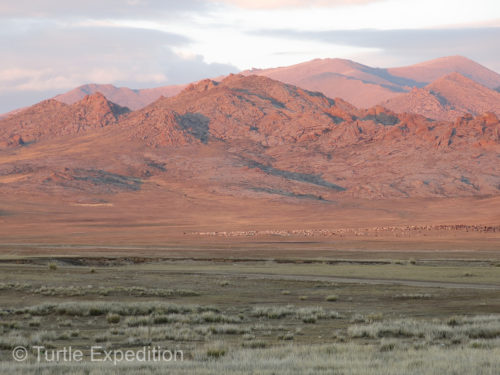
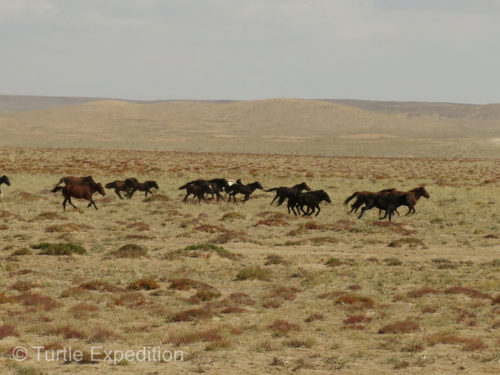
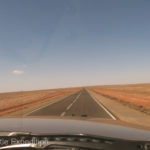
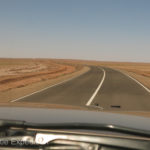
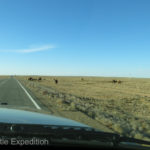
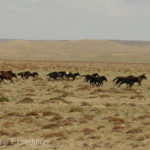
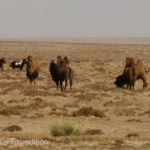
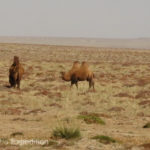
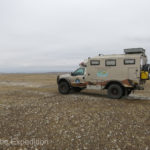
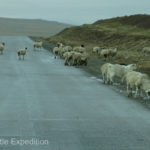
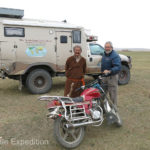
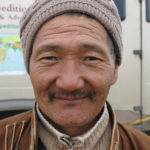
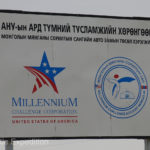
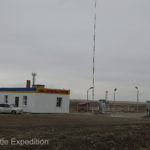
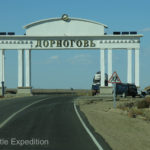
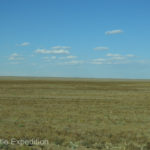
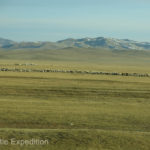
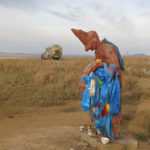
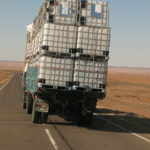
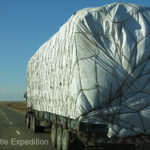
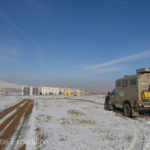
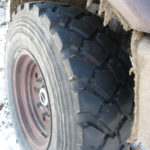
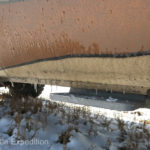
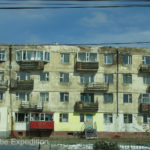
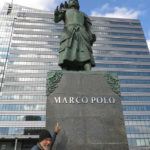
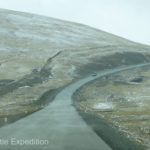
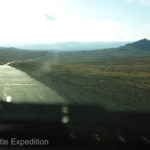
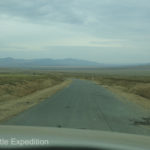
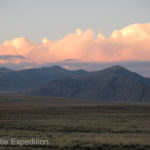
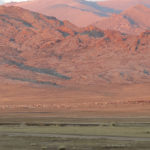
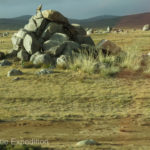
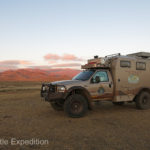





Leave a Comment